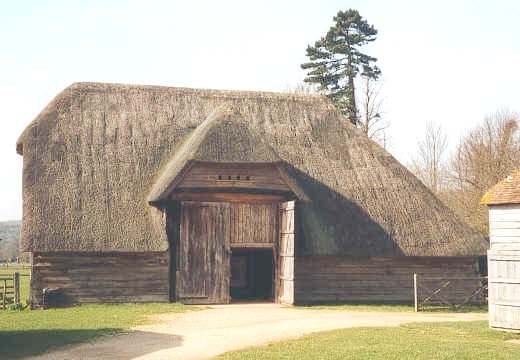Editor’s Note: This story is quote from Keightley but first appeared (in this form) in Literary Review 1825.
A farmer in Hampshire was sorely distressed by the unsettling of his barn. However straightly over-night he laid his sheaves on the threshing-floor for the application of the morning’s flail, when morning came, all was topsy-turvy, higgledy-piggledy, though the door remained locked, and there was no sign whatever of irregular entry. Resolved to find out who played him these mischievous pranks, Hodge couched himself one night deeply among the sheaves, and watched for the enemy. At length midnight arrived, the barn was illuminated as if by moonbeams of wonderful brightness, and through the key-hole came thousands of elves, the most diminutive that could be imagined. They immediately began their gambols among the straw, which was soon in a most admired disorder. Hodge wondered, but interfered not; but at last the supernatural thieves began to busy themselves in a way still less to his taste, for each elf set about conveying the crop away, a straw at a time, with astonishing activity and perseverance. The key-hole was still their port of egress and regress, and it resembled the aperture of a bee-hive, on a sunny day in June. The farmer was rather annoyed at seeing his grain vanish in this fashion, when one of the fairies said to another in the tiniest voice that ever was heard ‘weat, your weat?’ Hodge could contain himself no longer. He leaped out crying, ‘The devil sweat ye. Let me get among ye!’ when they all flew away so frightened that they never disturbed the barn any more (Keightley 305-306).
This version appears in Sternberg for Northamptonshire (134-135):
A worthy farmer, engaged in threshing, was sorely puzzled at the marvellous celerity with which his sheaves vanished: much faster, indeed, than accorded with the slow strokes of his flail. Extra bolts were placed on the doors, and a man stationed in the yard to watch; still, however, the evil was unremedied, and each morning, though it found the fastenings untouclied, brought with it a fresh gap in the mow. With the view of discovering the aggressors, Hodge determined upon a personal survey; and late one night ensconced himself behind the sheaves for that purpose. Midnight soon came, and with it two tiny elves, who effected their entrance through the pike-hole, and forthwith commenced working away at the sheaves, pulling out the straws, and making them into minute bundles, pre-paratory to carrying them off. As may be readily imagined, this was little to Hodge’s taste; but though astonished and alarmed, he interfered not. At length, apparently overcome by their exertions, they desisted from their work. ‘I twit; do you twit?’ said one to the other (quasi, I sweat; do you sweat?). The devil unable any longer to conceal his indignation: ‘I’ll twit ye if ye bent off!’ At which the spirits instantly vanished, and never afterwards annoyed him with their visits.


